Are you looking to create a community for your NFT project or DAO, without Discord or social media? Wondering if there's a better way to build a thriving community?
In this article, you'll learn about the emerging world of decentralized social media and how it can help you or your project.
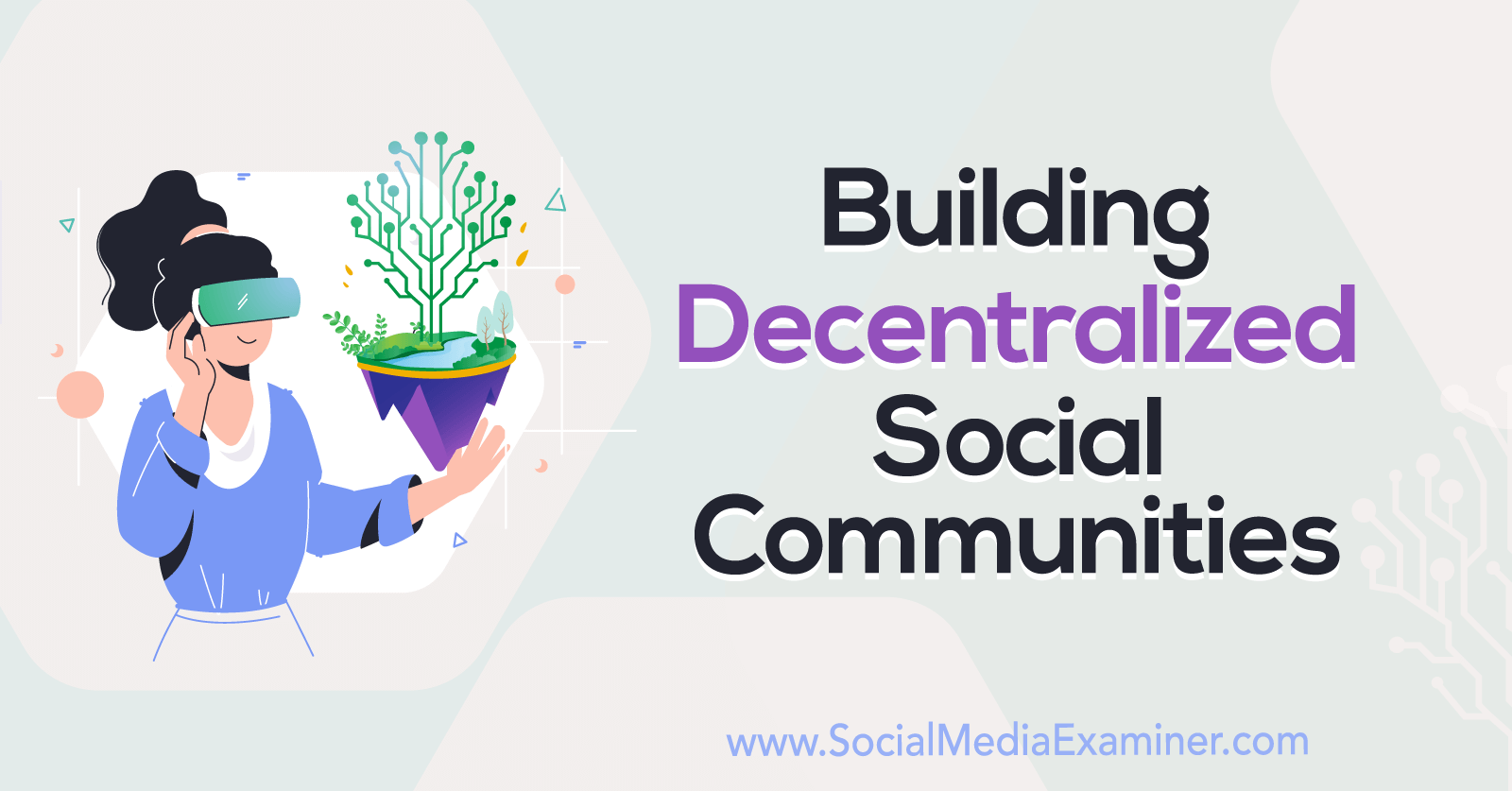
Why Businesses Should Pay Attention to Web3
Web3, at its core, mirrors the development of computers over time. In the 1960s, you had mainframes. Then you had personal computers and desktop computers. Then the internet was added. Then the switch to mobile came in the late 2000s. And with each advancement, new use cases and business platforms were developed that couldn't have been imagined prior.
Web3 and blockchain technology are the next stage. While the internet enables nearly instant transfer of information, the blockchain enables nearly instant transfer of monetary value. Not only can you send any amount of money anywhere in the world instantly but there also are utilities that can go along with that.
And these are hard commitments in the form of code on the blockchain. The code can't be changed. Prior to this point, every piece of code or application has been controlled by a centralized third-party like Google or Facebook, and those platforms can change their code any time they want.
But we've never had a paradigm that included code that couldn't be changed. A perfect example of this is bitcoin, which is code that anyone can look at. And it guarantees that there will never be more than 21 million bitcoins. Anyone can verify that on the blockchain, so people can trust it.
It's these hard commitments that create a lot of interesting primitives such as NFTs. We're looking at a future that combines the traditional Amazon Web Services (AWS) compute with the crypto compute. So people will be able to use NFTs, social tokens, and utility tokens in unique and interesting ways to add value to applications they're building, which opens up fascinating opportunities.
Challenges That Arise From Existing Social Platforms
There are a few issues with the current social media platforms related to opaqueness, data, innovation, and value distribution.
First, the opaqueness. Social platforms have closed-off, hidden algorithms that determine what content the world sees. They curtail the distribution of some content while promoting other content, and we don't know what goes into those algorithms or how those decisions are made.
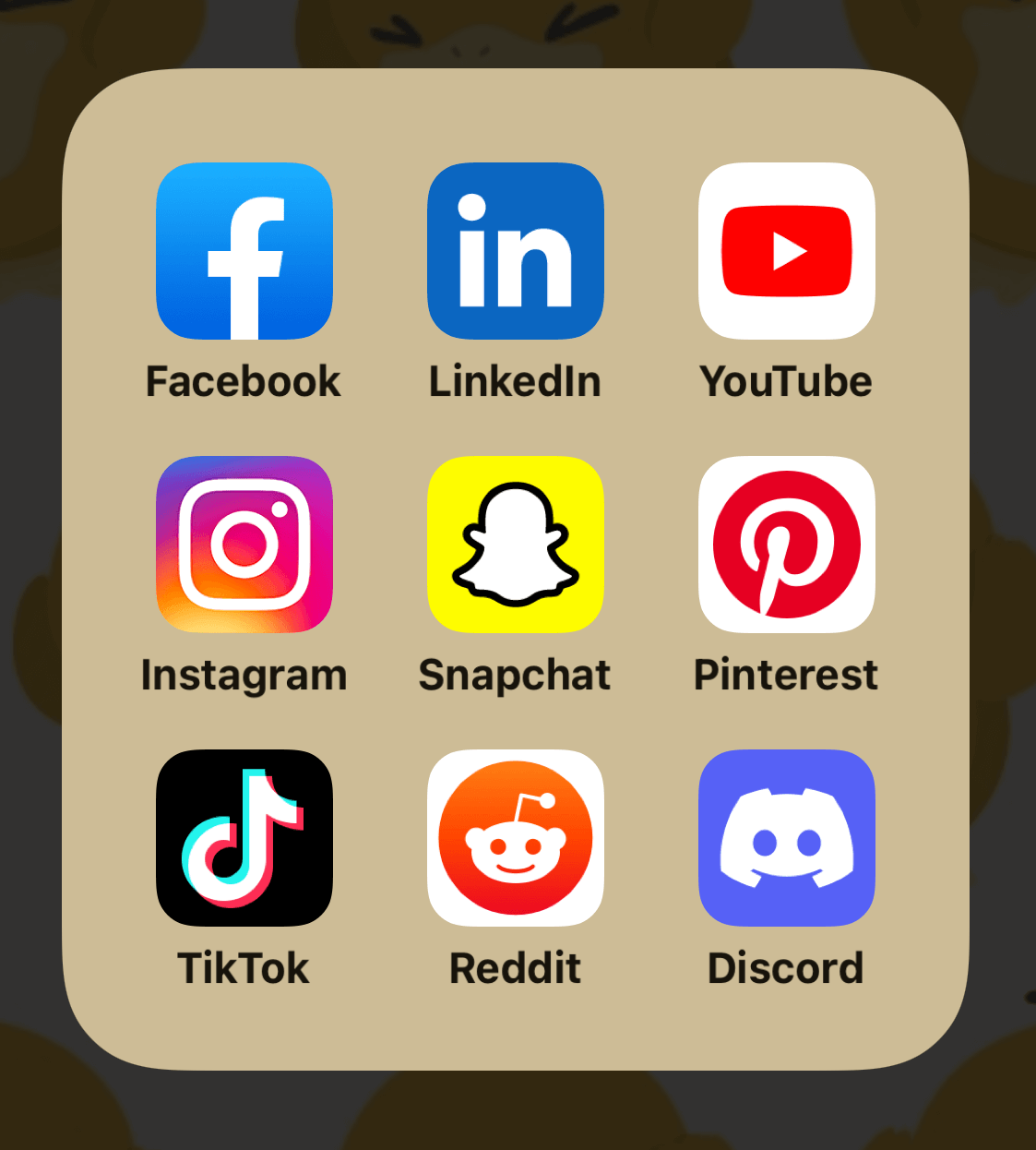
Social platforms also monopolize the data, which stunts innovation. If you don't like Twitter's feed algorithm or the fact that Facebook is using ads to monetize instead of a paid subscription model, there's no meaningful way for you to express those views.
The only option would be to build an entirely new social media network from scratch, which is obviously difficult to do. One of the reasons it's so hard is because Facebook owns all the data. So even if you were able to create a Facebook competitor, nobody's going to use it because all of their friends and family are still on Facebook and you can't access that data.
If that data pool were opened up, though, and anybody could have read and write access to it, other businesses could create a competitive offering to Facebook or an offering that innovates a feature on Facebook.
There are different use cases for something like this. For example, an engineer in India could build a clone of Facebook in India that's better tailored to meet the needs of the people there. By being able to use the data on Facebook, users would still be able to see posts from groups and friends and family members who are on the global Facebook network, just with a more tailored experience. It wouldn't require getting everyone to move from one platform to the other.
It's this type of monopoly on the data that keep platforms like Twitter and Facebook running the way they are. Because they have a monopoly on the data, they don't really have to worry much about competition. They can continue to do whatever they want with their platform, their users, the data, and the revenue they're generating from that data.
Get World-Class Marketing Training — All Year Long!
Are you facing doubt, uncertainty, or overwhelm? The Social Media Marketing Society can help.
Each month, you’ll receive training from trusted marketing experts, covering everything from AI to organic social marketing. When you join, you’ll also get immediate access to:
- A library of 100+ marketing trainings
- A community of like-minded marketers
- Monthly online community meetups
- Relevant news and trends updates
Back before Twitter had its own app and an open API, its data was open and everybody could use it. This led to the development of some amazing free tools that anybody could use to see what was happening on the platform. Over time, it began restricting access to its API.
This closed API meant that the only way for users to access new features was to use the Twitter app. This is a perfect example of what we mentioned earlier about third-party servers being able to change the code at any time. In Web3, using the blockchain, a platform wouldn't be able to suddenly cut off its data to keep people from innovating and building on top of it. It wouldn't be able to close off its code and ecosystem to the world to monopolize the data.
In addition to monopolized data and stunted innovation, the way that the value is built and rewarded on social media platforms is also an issue. The value of being on the platform comes from the users who are creating the content, publishing posts, and building communities. Yet the people who are creating this value aren't reaping the rewards from it.
The platforms are able to monetize and benefit from their users and data. But they don't distribute or share the benefits with the people who are actually creating the value.
What Is Progressive Decentralization?
In Web3, crypto innovators have to be able to do two things:
- Build something people want and find product-market fit.
- Decentralize governance and turn ownership and control over to the community.
These are two fairly difficult issues to work out. There are a lot of failed projects that tried to tackle both of these issues at the same time—trying to find product-market fit while decentralizing their governance—and this led to new and unexpected problems.
Decentralized autonomous organizations (DAOs) are a perfect example of decentralized governance, and they move slowly. There are a lot of arguments. Nobody's really taking control or being decisive, and therefore they lose a lot of the advantages of being a startup.
Progressive decentralization is the principle that allows new crypto founders and startups the ability to work through these issues. They can start by solving for the product-market fit. Get out into the world, get their product working, and gather clear signs of product-market fit. They can even develop plans for retention and growth, all with solid leadership that can make decisions in a timely manner to keep the project running.

Once that product-market fit has been found, they can start building a community around that product and running it more like an open source project. They can, for example, put bounties for people to build out certain features, community management work, and operations work.

Discover Proven Marketing Strategies and Tips
Want to go even deeper with your marketing? Check out the Social Media Marketing Podcast! Publishing weekly since 2012, the Social Media Marketing Podcast helps you navigate the constantly changing marketing jungle, with expert interviews from marketing pros.
But don’t let the name fool you. This show is about a lot more than just social media marketing. With over 600 episodes and millions of downloads each year, this show has been a trusted source for marketers for well over a decade.
Several systems need to be put into place at this point, and processes need to be built that can facilitate people contributing to the new platform. You have to create new ways of incentivizing these contributions. And they must be sustainable so your project doesn't flame out or lose direction the minute your direct leadership is moved over. But once these things are in place, then you can turn ownership and control of your project to the community.
A lot of crypto projects do this through the use of a governance token as a means of distributing ownership and creating a treasury to fund future operations. Then members of the community can begin voting and steering and governing this new entity. There are some other factors you need to consider as well, including securities laws.
gm.xyz, an emerging Web3 community platform, is trying to build a useful social network. To do that, they need centralized leadership with somebody taking the helm so that's the stuff they're working on now. But once they have that product-market fit, then they'll be putting processes in place. They'll open source parts of their code base and start putting out bounties and allowing people to contribute.
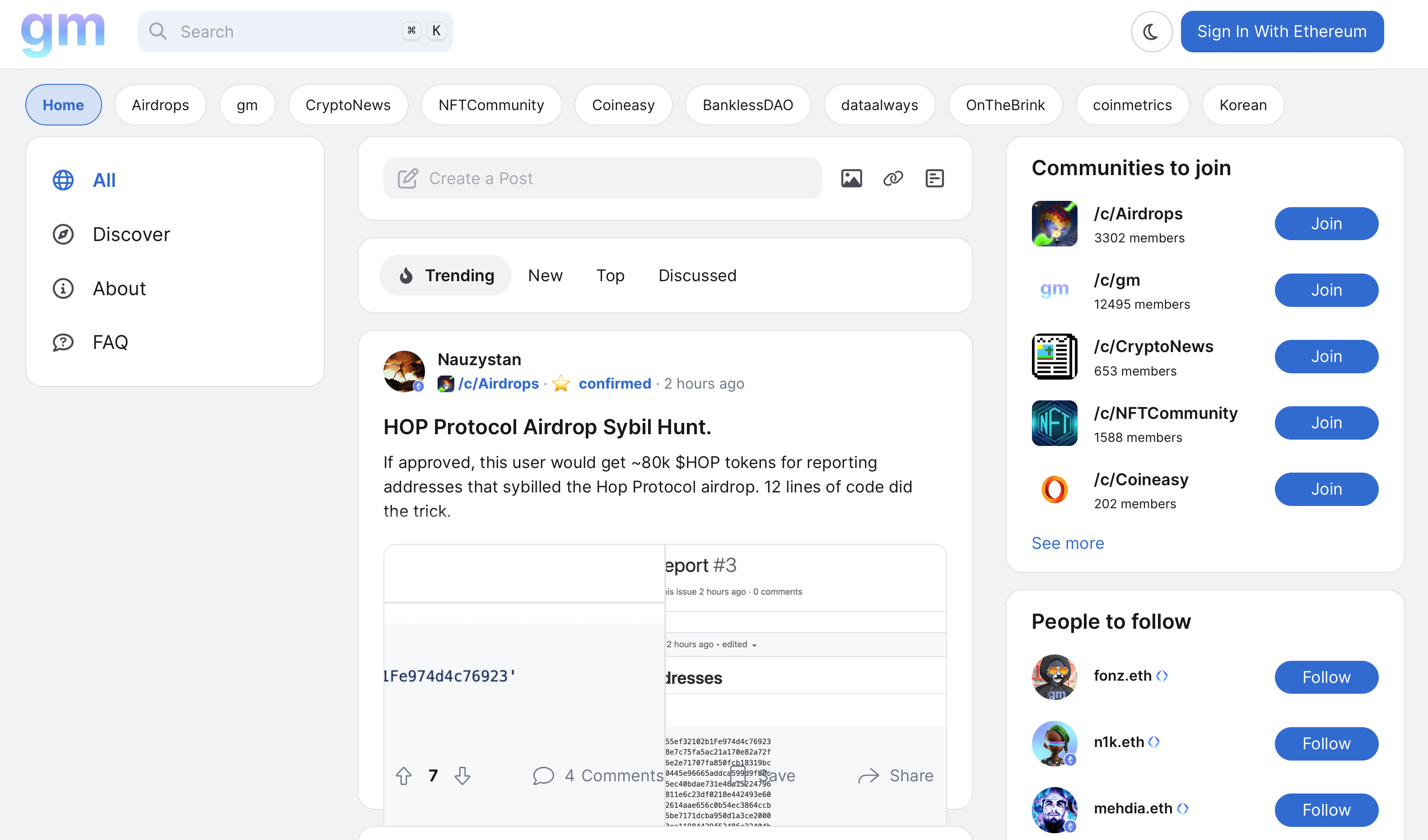
After that point, they'll begin building that community and those processes for sustainable governance. This will allow their community to trust their guarantee that they can't change anything later down the road the way other social platforms could.
How gm.xyz Is Different From Other Crypto Communities
Today, the majority of Web3 communities are built on Discord. However, Discord isn't designed to work at scale for large, engaged communities. Discord is a chat app, similar to Slack, so it's very good for quick communication. But finding past conversations isn't so easy. You might have to scroll back pages upon pages on a server to find a conversation so it's easy to miss important information.
gm.xyz is working to build a social platform with threaded conversations—much like the ones we're used to seeing on social platforms like Facebook and Twitter—that works on the blockchain. They're implementing tools that make it easier for crypto communities to keep up with the conversations they're trying to follow without being overwhelmed with notifications or having to check into multiple chats and multiple servers to do so.
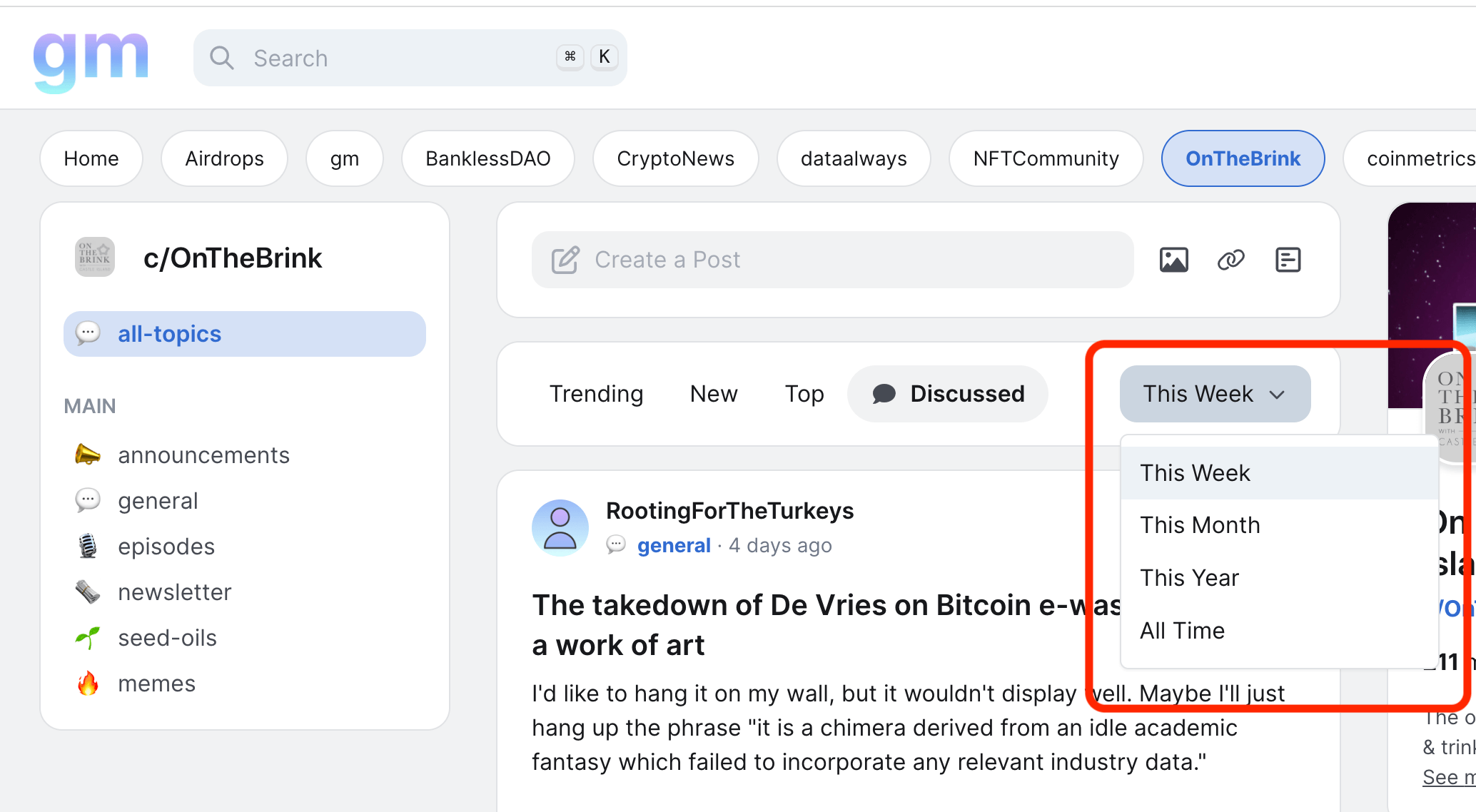
Almost nothing on gm.xyz is token-gated at the moment. Anyone with some ethereum in their wallet can join the platform, and then join any of the communities currently on the platform and jump into the conversation.
The only way to build a community on the platform currently is to go through a manual process of filling out the application and then interviewing with the founders to discuss the community you want to build. This is to protect the platform from being overrun by well-intentioned founders who build communities and leave them abandoned before they can take off.
gm.xyz currently supports all Ethereum NFTs, as well as POAP (proof of attendance protocol) badges. The advantage of a POAP is that it's cheap to mint. POAPs are basically NFTs. They're on their own L1 chain and they're exactly as you'd expect: proof that you attended some experience.
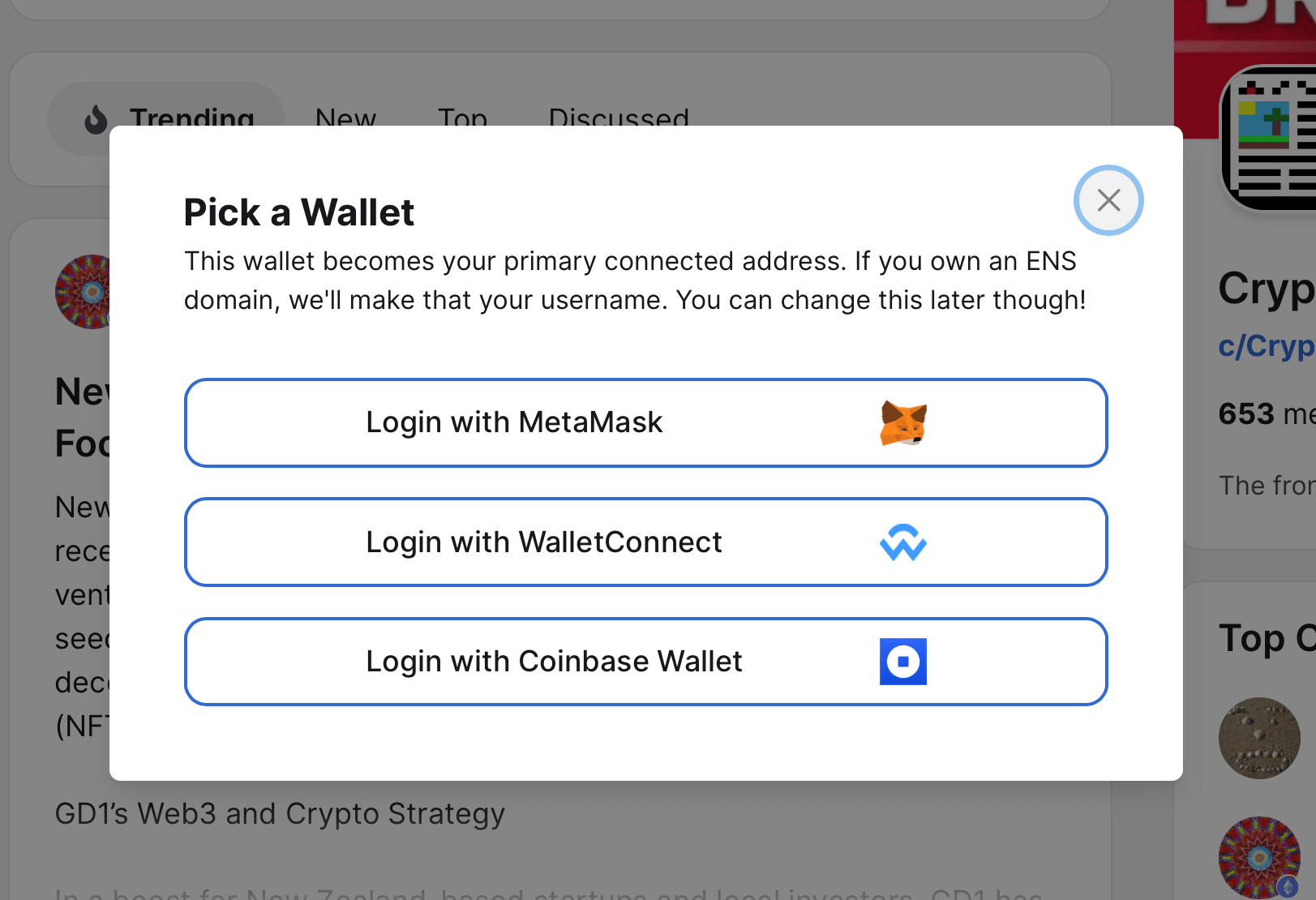
A lot of conferences are using POAPs. And in terms of a Web3 community built on a platform like gm.xyz, these badges proving attendance could be shown on profiles or used to grant access to future experiences by having them in wallets. The goal is to allow you to set off exclusive sections within your community based on a user's level of involvement.
But in nearly every other way, gm.xyz is building in all the features we've come to rely on in traditional social media platforms such as community threads, direct messaging, and private groups.
What Does the Future of Online Communities in Web3 Look Like for Businesses?
Web3 provides new, innovative ways to transfer and capture value that weren't possible before. Combine this in interesting ways with traditional Web 2.0 applications and the potential is limitless.
A lot of people are predicting that Web3 will be the inevitable transition from Web 2.0, but there's just as much chance that it will be a blend of the two. Like the mobile revolution, the fact that everyone has mobile phones now and can access the internet easily from the palm of their hands doesn't mean that computers are dead. Everyone still uses laptops and desktops. And the same will be said for Web3 moving forward at least for the foreseeable future.
Michael McGuiness is a software engineer and co-founder of gm.xyz, a free Web3 social platform for communities such as DAOs and NFT projects. Find Michael on Twitter at @mikemcg0 and learn more about him at MichaelMcGuiness.com.
Other Notes From This Episode
- Check out Collab.Land and Proof of Humanity.
- Connect with Michael Stelzner at @Stelzner on Instagram.
- Watch the interviews on the Crypto Business YouTube channel.
Listen to the Podcast Now
This article is sourced from the Crypto Business podcast. Listen or subscribe below.
Where to subscribe: Apple Podcast | Google Podcasts | Spotify | Amazon Music | RSS
✋🏽 If you enjoyed this episode of the Crypto Business podcast, please head over to Apple Podcasts, leave a rating, write a review, and subscribe.
Disclaimer: The information provided on this website is provided solely for educational purposes and does not constitute any advice, including but not limited to, investment advice, trading advice or financial advice, and you should not treat any of the website's content as such. Social Media Examiner recommends that you independently research any information contained on this Website and that you speak with an investment professional before making any decision to purchase, trade, hold or sell cryptocurrency. Nothing herein should be treated as a recommendation to buy, sell or hold cryptocurrency. Social Media Examiner cannot guarantee the accuracy of any information listed on the website and is not responsible for any missing or wrong information. All information is provided as is and should be used at your own risk. Social Media Examiner disclaims all responsibility and liability for your use of any information found on the website.
Attention Agency Owners, Brand Marketers, and Consultants

Introducing the Marketing Agency Show–our newest podcast designed to explore the struggles of agency marketers.
Join show host and agency owner, Brooke Sellas, as she interviews agency marketers and digs deep into their biggest challenges. Explore topics like navigating rough economic times, leveraging AI, service diversification, client acquisition, and much more.
Just pull up your favorite podcast app, search for Marketing Agency Show and start listening. Or click the button below for more information.

